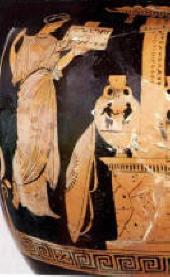|

Counting Electronic Votes
Click
here for the Attorney General's letter:
YOU HAVE THE RIGHT TO WATCH
(November 2008)
Question: On
Election Night, when electronic voting machines are opened
and the votes tallied, do ordinary citizens have a right to
watch the poll workers announce the election results?
In New Jersey, poll-watchers are called "challengers." In
November 2008, it was
not particularly clear whether special authorization was
required to watch the poll workers handle electronic voting
machines. So, in an abundance of caution, I submitted a
formal application for "challenger badges" to the Mercer
County Board of Elections.
First, the
Election Board Says No
The Election Board said – I kid you not – that the
presidential election was “too important” to allow members
of the public to watch the poll workers.
The Election Board even went so far as to suggest that my
written application was fraudulent. Here is its
first response.
Admittedly, my request was unusual. Ordinarily,
"challengers" are appointed by political parties, whereas my
request was non-partisan. I applied on behalf of five
people: two Princeton University students, two professors,
and myself. By phone, I explained our interest in merely
watching the poll workers - but the Election Board wouldn't
budge.
OF COURSE we understood that the poll workers might not want
extra people getting in the way on Election Night.
That’s why we took measures to get special authorization!
To ensure that we could be lawfully present, we asked for
challengers’ badges as proponents and opponents of two
public questions (as opposed to political candidates). Our
request was entirely in compliance with state law, as all
the prospective challengers were registered to vote in
Mercer County.
By phone, the Election Board expressed "concern" about the
status of Professor
Andrew Appel, who is an expert on Sequoia voting machines
(the kind we use). The Board conveyed its assurances that
Sequoia had fixed all the problems Professor Appel
identified in past elections, but still declined to let
us watch.
We decided to retain counsel.
Jeff Wild of Lowenstein Sandler
very graciously stepped forward to represent us pro bono.
You can read his letter
here.
Then, the Attorney General Says Yes
Backpedaling fast, thanks to Jeff, the BOE now says there
was never any problem – the announcement of the results is
always done in public, and no credentials are required to
observe. After much ado, Jeff managed to extract a
one-sentence letter from the Attorney General’s office. It
says that, under NJSA 19:6-2, the announcement of the
election results is “open and public.” You can see the
letter
here.
Silly Denouement
As difficult as it was to generate a letter, the AG’s office
summoned enough resources to dispatch three teams of Deputy
Attorneys General to watch my students and colleagues on
Election Night.
When my husband and I walked in to our polling place at
7:45pm, there were two guys in dark suits, seated at a
special table. They were waiting for us, and had been there
since mid-afternoon. They turned out to be perfectly
friendly, and mildly amused at their assignment. They said
two teams were dispatched to Princeton schools and one team
to Princeton University. Andrew Appel’s polling place, at
the second Princeton school, had a special Welcoming
Committee too!
The undergrads didn’t report seeing DAGs, but I have a
couple of hypotheses about this. One, the undergrads were
voting for the first time and may not have recognized the
difference between a poll worker and a DAG. Two, the team of
DAGs dispatched to Princeton University might have gone to
the wrong polling place. There were three possible places
for undergrads to vote, and we had watchers in 2 of the 3.
Maybe the DAGs went to the third.
Our DAGs watched us watch the poll workers. We created no
problems (obviously!), and the entire vote-count was
finished within a half hour.
We must have made the Attorney General’s office very nervous
with our proposal to exercise our statutory rights! Six
attorneys general assigned to watch us - what a silly waste
of government resources!
That said, we did observe some irregularities in the
procedures that the poll workers followed at all three
sites. Generally, the poll workers appeared unsure how to
proceed. The followed written
directions, but did not know how to interpret some of them.
The most significant irregularity I personally observed was
the failure to keep and record the cable-tie seals in the
guts of the electronic voting machines. These cable ties
secured the “results cartridges” and were supposed to be
forwarded to the County Board of Elections.
Also, at one of the polling places, in addition to the team
from the AG's office, either the County or the State board
of elections sent an extra professional to walk the poll
workers through all the procedures. Thus, by alerting them
in advance to three specific polling places, we were not
watching "typical" precincts. Ed Felten points out that
this shows the importance of the public being able to watch
at any polling place, without asking specific permission
first.
Grayson
|



